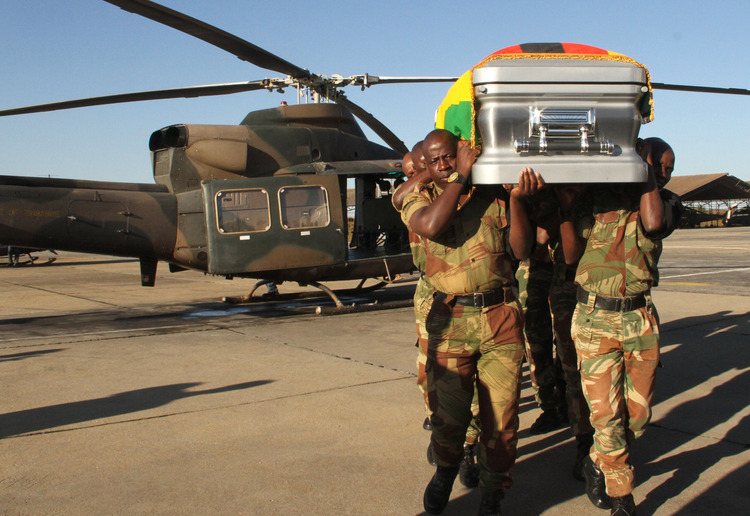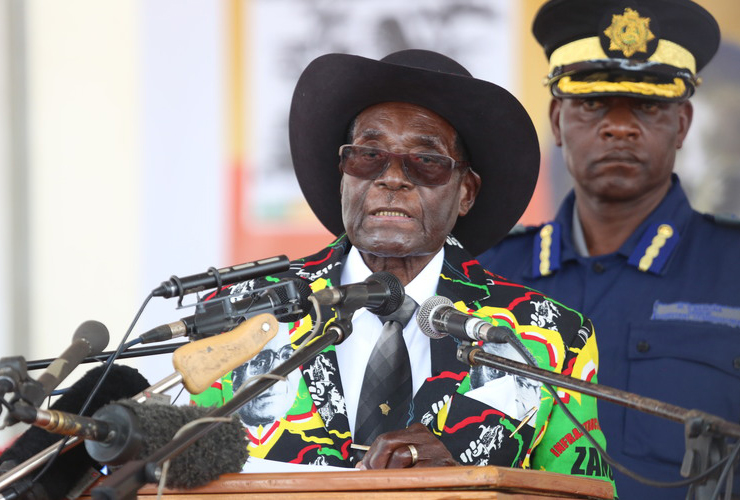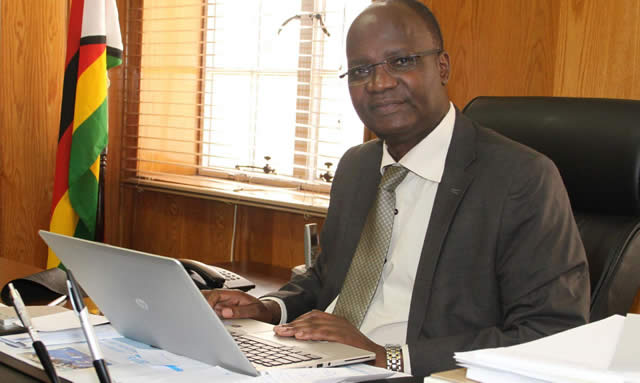National hero Ndlovu’s body arrives for burial


Pallbearers carry the casket bearing the body of National Hero Cde Naison Khutshwekhaya Ndlovu at Manyame Airbase in Harare yesterday. — (Picture by Tawanda Mudimu)
Elita Chikwati Senior Reporter
The body of national hero Cde Naison Khutshwekhaya Ndlovu arrived in Harare yesterday from Bulawayo ahead of burial at the National Heroes Acre this morning, where thousands of mourners from all walks of life are expected to turn up. Cde Ndlovu succumbed to prostate cancer on Monday in Bulawayo.
He was 86.
His body arrived at Manyame Airbase yesterday afternoon aboard an Air Force of Zimbabwe helicopter and was taken to the Defence Forces Funeral Parlour at One Commando Regiment in preparation for burial today.
The body was accompanied from Bulawayo by Minister of State for Matabeleland South Provincial Affairs Abednigo Ncube and close relatives.
It was welcomed at Manyame Airbase by Zanu-PF spokesperson Cde Simon Khaya Moyo, Welfare Services for War Veterans, War Collaborators, Former Political Detainees and Restrictees Minister Tshinga Dube and senior officials from the Ministry of Home Affairs.
At One Commando, Commander of the Zimbabwe National Army Lieutenant General Philip Valerio Sibanda and other senior army officials were present to received the body.
Describing the late national hero at One Commando, Cde Khaya Moyo said Cde Ndlovu was a unifier who hated tribalism and regionalism.
He said he knew the late national hero since the 1960s and also worked closely with him in the 1970s in Zambia.
“I started knowing him in the 1960s as youths and I can confidently say he was a principled man of purpose and a strict disciplinarian,” said Cde Khaya Moyo.
“He is one of the people who contributed immensely to the liberation struggle. We met again in Zambia in the 1970s and he had a great responsibility in the training of people, refugees at Leather Work Victory Camp in Lusaka.
“He also gave us advice in terms of the journey he had gone through, including incarceration and torture. He gave us courage to ensure we never let our people down. At that time I was special assistant to the late Vice President Joshua Nkomo.”
Cde Khaya Moyo said Cde Ndlovu believed in uniting people regardless of tribe or region.
“He believed in unity of people as a whole,” he said.
“He left a legacy that Zimbabwe is ours together, that most of us can learn from each other and see each other through as a family. I trust Zimbabwe remains united. This is a challenge to the youths and those who love power. The answer to our situation is unity. We say go well and rest in eternal peace Cde Ndlovu.”
Speaking at a Press conference at her offices, Minister of State for Harare Province Cde Miriam Chikukwa urged Zimbabweans to come in their numbers to bid farewell to “the gallant son of the soil”.
“Transport will be available from the usual pick up points,” she said.
“Let us all come at the Heroes Acre to witness the burial of our hero. As Zimbabwe, we are mourning. We have lost a hero. To the Ndlovu family I say may God comfort you as a family.
“There will be 20 buses from Harare, 11 buses from Bulawayo and Matabeleland South and the remaining provinces will have a bus each to ferry mourners to the national shrine.”
Cde Ndlovu, a Zanu-PF Central Committee member, was the national chairman of PF Zapu at the signing of the Unity Accord in 1987 and the first black mayor of Bulawayo, assuming the post in 1981 and serving for two terms.
He also served as Deputy Senate President from 2008 to 2013.
Cde Ndlovu was the only surviving member from the PF Zapu side involved in initial talks towards uniting PF Zapu and Zanu.
He belonged to the early crop of African nationalists who pioneered the resistance to white colonialism and fought for black majority rule.
He endured long stints in jail and detentions at the hands of the Smith regime and never betrayed the liberation struggle.
Born in Gwatemba, Filabusi, on October 22, 1930, Cde Ndlovu began his education at Zezani Secondary School in Beitbridge, where he did Standard One and Two.
He went back to Gwatemba to finish Standard three before proceeding to Wanezi Mission for Standard Six and later proceeded to Umzingwane Government School, where he trained in leather work.
After attaining a certificate in leather work, Cde Ndlovu taught at Zezani School and Matopo Mission in 1950 and 1953 respectively before proceeding to Empandeni Mission.
He escaped to Zambia via Botswana and six months later his father was murdered when an arms cache was found at his home.
In Zambia, Cde Ndlovu became a member of the war council and coordinated production activities of Zapu until his return to Zimbabwe in January 1980, following the successful conclusion of the Lancaster House negotiations.
Cde Ndlovu remained very active after the liberation struggle, although he was not very actively involved in central Government.











Comments